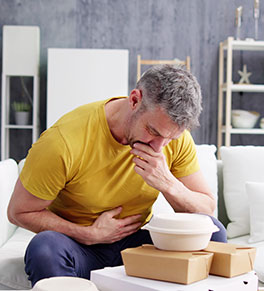
Gastroesophageal Reflux Disease (GERD)
Gastroesophageal reflux disease (GERD) affects millions of people each year, causing chronic heartburn and painful acid regurgitation. Our UCI Health esophageal disease specialists offer thorough evaluations, proactive care, and innovative treatments to reduce or even eliminate your GERD symptoms.
GERD symptoms
Nearly a third of all Americans experience heartburn at least once a month.
Heartburn—also called acid indigestion, acid reflux, or gastroesophageal reflux (GER)—happens when stomach acid backs up into the esophagus, the tube that carries food to your stomach.
Other common symptoms of GERD can include:
- backwash of food or sour liquid in the throat
- upper belly or chest pain
- trouble swallowing, called dysphagia
- sensation of a lump in the throat
Prolonged exposure to stomach fluids can damage the esophagus, throat, and vocal cords, leading to hoarseness or more serious issues.
It can also cause abnormal cell growth (Barrett’s esophagus), a precursor to esophageal cancer. Ulcers and scarring may lead to strictures, narrowing the esophagus and making it hard to swallow.
Our specialists are experienced in treating GERD, Barrett’s esophagus, hiatal hernias, and esophageal cancer. Early intervention can stop or even reverse the disease cycle.

Get relief for your acid reflux with the GI specialists at UCI Health
Our expert team is here to guide you through every step of your treatment.
Call 888-717-4463 to schedule an appointment, or
We welcome referrals from community physicians
Simply complete and fax the appropriate referral form to the Chao Digestive Health Institute.
We look forward to serving you and your patients.

Find a digestive health clinical trial
Talk to your doctor to see if a digestive health clinical trial is right for you.
Featured Blog Posts

Heartburn vs GERD: What's the difference?
Gastroesophageal reflux disease is a chronic condition that puts people at greater risk for developing more serious conditions, including esophageal cancer.

Raspy voice? Chronic cough? It might be GERD
Recognizing lesser-known symptoms of gastroesophageal reflux disease lets you get help earlier, when it is most treatable.

His GERD is now a distant memory
An endoscopic surgery called cTIF has freed Gerald Maguire from a lifetime of debilitating acid reflux.
GERD diagnosis at UCI Health
Experiencing frequent heartburn and regurgitation can affect your normal activities. To get a clearer diagnosis and understand the severity of the problem, your doctor may recommend tests such as:
- X-ray of the upper digestive tract (Barium swallow): You drink a chalky liquid, and X-rays are taken to show the shape and condition of your esophagus, stomach, and upper intestine.
- Upper endoscopy: A thin tube with a camera is used to check for signs of inflammation or complications like Barrett's esophagus. Tissue samples may be taken for further testing.
- Acidity monitoring: A device measures the amount and duration of stomach acid in your esophagus over 48 hours. This can help link symptoms with acid reflux.
- Esophageal manometry: A thin tube with pressure sensors is used to measure the strength and coordination of muscle movement in your esophagus, helping evaluate how well your muscles and lower esophageal sphincter are working.
Based on the results, your doctor may recommend lifestyle changes, medications, or possibly procedures or surgery.
Our clinicians
Gastroenterologists
- Gregory Albers, MD
- William Karnes, MD
- Robert Lee, MD
- Christina Ling, MD
- Hooshang Meshkinpour, MD
- Nimisha Parekh, MD
- Sandra Park, MD
- Shravani R. Reddy, MD
- Carlos Saad, MD
Interventional gastroenterologists
Gastrointestinal surgeons
- Shaun C. Daly, MD
- Marcelo Hinojosa, MD
- Ninh Nguyen, MD
- Brian Smith, MD
- Annie Wang, MD
-
Annie Wang, MD
-
Annie Wang, MD
Annie Wang, MD
GERD treatment at UCI Health
Once you’re diagnosed with GERD, diet and lifestyle changes are usually recommended to help reduce pain and heartburn. These include:
- losing weight
- eating smaller, slower meals
- avoiding trigger foods and drinks
- staying upright after meals
- quitting smoking
- raising the head of your bed
Medications may also be recommended, such as:
- antacids
- H2 blockers
- proton pump inhibitors
- prokinetics
While medications can help many people, long-term use of proton pump inhibitors has been linked to serious issues, like osteoporosis-related fractures.
Next Steps:
If medications aren’t enough, fundoplication surgery may be needed. This minimally invasive surgery wraps the top of your stomach around the lower esophagus to help prevent acid reflux.
You’ll likely stay in the hospital for one day and recover over a few weeks.
Our specialists also offer less invasive, FDA-approved alternatives like:
Why choose UCI Health for GERD care
Advanced, minimally invasive treatments
The Chao Digestive Health Institute is the only healthcare provider in Orange County and Southern California to offer minimally invasive alternatives to standard surgical treatment for GERD.
- TIF® with Esophyx®
- LINX® Reflux Management System
- laparoscopic Nissen fundoplication
Our GERD experts also pioneered cTIF, a cutting-edge procedure that combines laparoscopic hiatal hernia repair with TIF® in one session to fix the root cause of your GERD.
Whole-person care
GERD can raise your risk of esophageal cancer, which is why our team takes a comprehensive approach to address all factors and help ensure the best long-term results for you.




